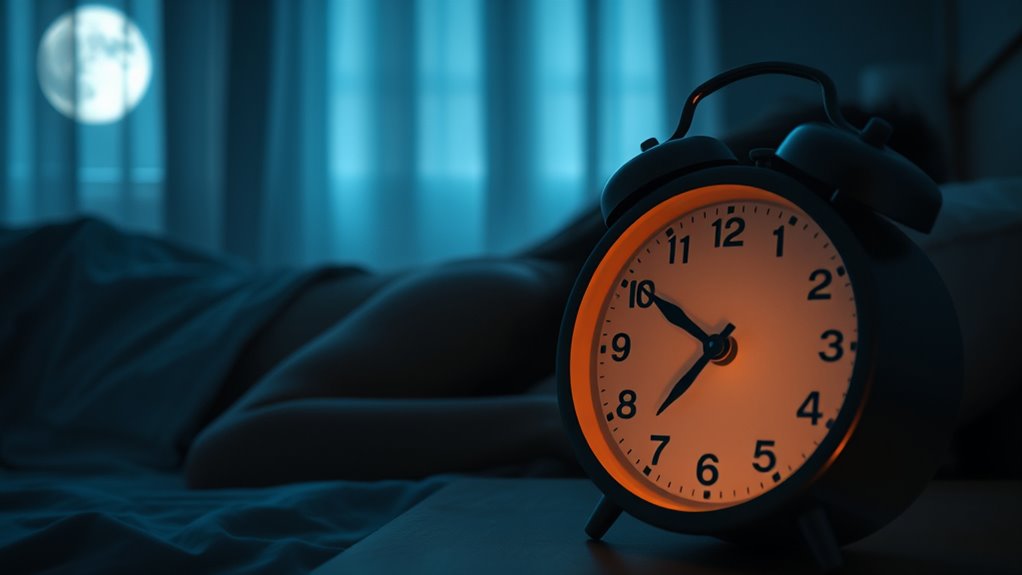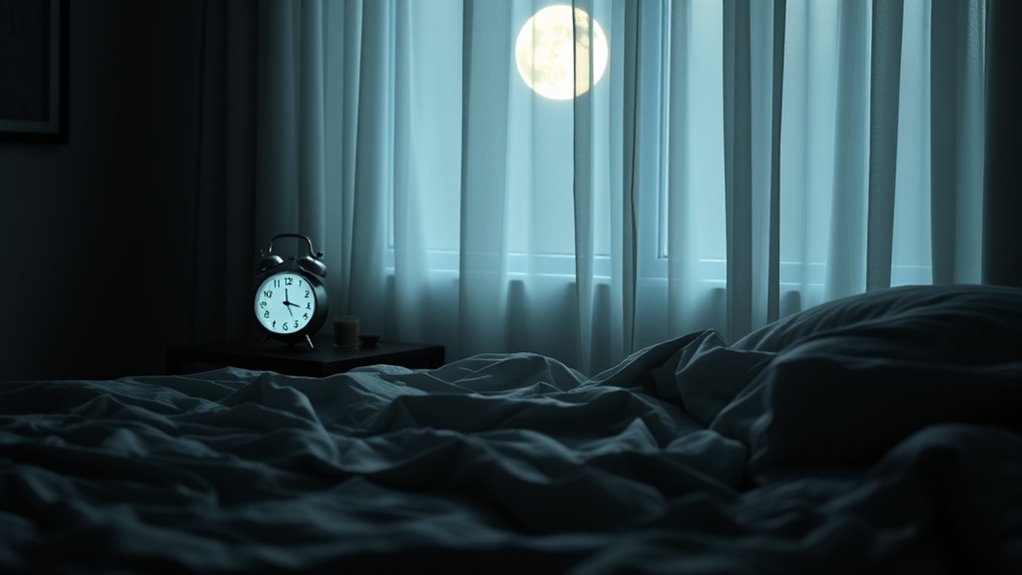Waking up at the same time each night often signals your sleep cycles or subconscious signals at play. It may align with specific sleep stages, like REM, which influences vivid dreams and awareness. Stress, habits, or sleep disruptions can also cause recurring wake times. These wake-ups could be messages from your body or mind about your health or subconscious thoughts. Pay attention to these patterns, as understanding them might reveal more about your sleep and dreams as you explore further.
Key Takeaways
- Repeated wake times often align with specific sleep stages, especially REM, influencing vivid dreams and dream recall.
- Consistent wake-up times may signal subconscious messages or patterns related to your emotional or mental state.
- Waking at the same time nightly can reflect body’s natural circadian rhythm and sleep cycle, indicating optimal or disrupted sleep phases.
- Such wake-ups can be opportunities for lucid dreaming or recognizing meaningful symbols in your dreams.
- Analyzing sleep habits and using trackers can help understand and potentially adjust wake times for better rest and self-awareness.

Dream numbers have fascinated people for centuries, often seen as symbols of luck or messages from the subconscious. When you wake up at the same time every night, it might feel like more than just coincidence. Instead, it could be your mind signaling something deeper, possibly linked to your sleep cycle analysis or even lucid dreaming. Our bodies follow rhythmic patterns, and your sleep cycle is no exception. Typically, your sleep is divided into stages, cycling through light sleep, deep sleep, and REM sleep. These cycles last about 90 minutes each, and waking up at the same point in this pattern can cause you to wake up at the same time every night. For example, if you consistently wake at 3:00 a.m., it might correlate with a particular stage of sleep your body naturally enters or exits.
By paying attention to these recurring wake times, you can better understand your sleep cycle analysis. Tracking your sleep patterns helps reveal whether you’re waking during REM sleep, which often occurs in the later stages of your sleep cycle. REM sleep is when most dreaming happens, and if you’re waking during this phase, it could explain why those moments feel particularly vivid or memorable. Some people even use techniques related to lucid dreaming to influence their sleep. Lucid dreaming involves becoming aware that you’re dreaming while still in the dream state, and certain wake times might be prime opportunities for this awareness to emerge naturally. If you wake up during a REM cycle, you might find it easier to recognize you’re dreaming and even control the dream.
Understanding why you wake up at the same time each night can also involve examining your pre-sleep habits and environment. Stress, caffeine intake, or irregular sleep schedules can cause disruptions, making your body more prone to waking during specific phases of sleep. Analyzing your sleep cycle allows you to identify patterns and adjust your bedtime accordingly, helping you achieve more restful nights. Techniques like sleep cycle analysis often involve using sleep trackers or apps that monitor your sleep stages, giving you insights into when and why these wake-ups occur.
In the end, waking at the same time every night isn’t just a random occurrence; it’s a signal from your body about your sleep health. By understanding your sleep cycle and exploring concepts like lucid dreaming, you can better manage these wake-up times, potentially turning them into opportunities for vivid dreams or even self-discovery. Recognizing these signs helps you take control of your sleep and wakefulness, leading to more restorative rest and a clearer understanding of your subconscious signals.
Frequently Asked Questions
Can Dreaming About Specific Numbers Predict Future Events?
Dreaming about specific numbers might seem meaningful, but it doesn’t predict future events. In numerology symbolism, numbers in dreams often reflect your subconscious thoughts or feelings, not future outcomes. Through dream interpretation, you can uncover personal insights, but these symbols aren’t reliable for predicting the future. Focus on how the numbers make you feel and what they represent in your life, rather than expecting them to foretell what’s to come.
Do Cultural Beliefs Influence Dream Number Interpretations?
Imagine you dream of the number seven, and in your culture, it’s seen as lucky. Cultural symbolism deeply influences how you interpret dream numbers, shaping your beliefs and reactions. For example, in some societies, certain numbers are linked to positive or negative outcomes through numerical superstition. Your cultural background guides whether you see these numbers as meaningful signs or mere coincidences, affecting your overall perception and response.
How Do Sleep Cycles Affect the Timing of Recurring Dreams?
Your sleep cycles, influenced by brainwave patterns and sleep architecture, play a key role in recurring dreams. As you move through different sleep stages, certain brainwave patterns trigger specific dream themes. When your sleep architecture remains consistent, these patterns recur at similar times, causing you to wake up at the same moments each night. This cyclical process makes recurring dreams more likely, tying your sleep structure closely to dream timing.
Are There Any Health Implications Linked to Waking up at the Same Time Nightly?
Did you know that waking up at the same time nightly can signal disrupted sleep hygiene or circadian rhythms? This pattern might affect your overall health, increasing risks like heart issues or mental health concerns. Consistent sleep timing supports your body’s natural clock, so paying attention to this habit can help improve your sleep quality. Maintaining a regular sleep schedule benefits your physical and mental well-being, promoting better health long-term.
Can Stress or Anxiety Cause Recurring Dreams at Specific Times?
Stress or anxiety can indeed cause recurring dreams at specific times. When stress triggers your anxiety responses, your mind processes unresolved issues during sleep, leading to these patterns. You might wake up at the same time each night because your body is responding to underlying stress, making certain dreams more vivid or frequent. Managing stress through relaxation techniques can help reduce these recurring dreams and improve your sleep quality.
Conclusion
Your nightly routine is like a whisper from your subconscious, guiding you to specific times as if they hold secret messages. Waking up at the same time isn’t just a coincidence—it’s your mind’s way of sending signals. Pay attention to these moments; they’re like puzzle pieces fitting together in the grand mosaic of your dreams. Embrace these recurring wake-up calls, and you might just release the hidden meanings behind your sleep signals.










